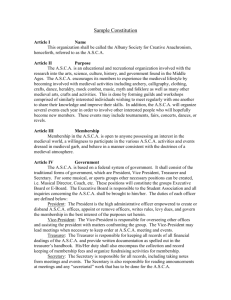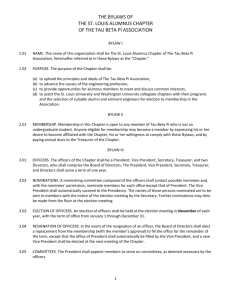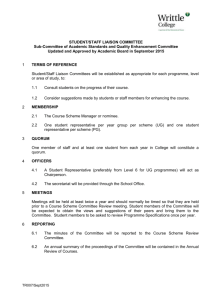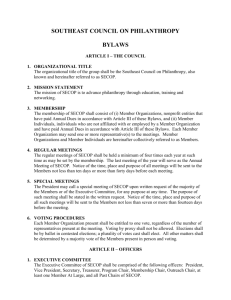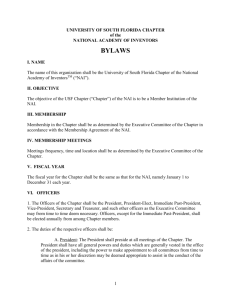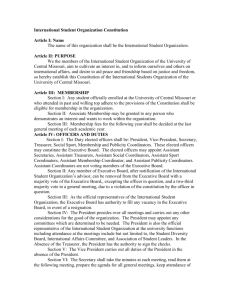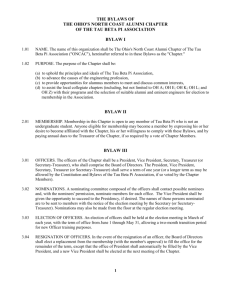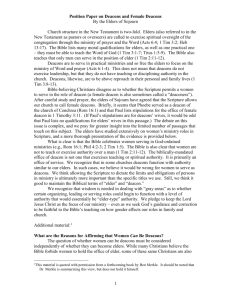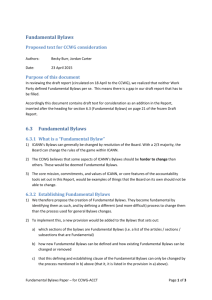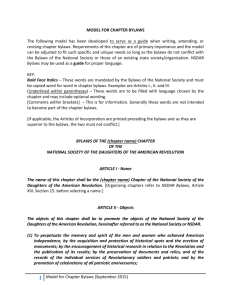Overview of Corporate Bylaws for Madison Square Presbyterian
advertisement
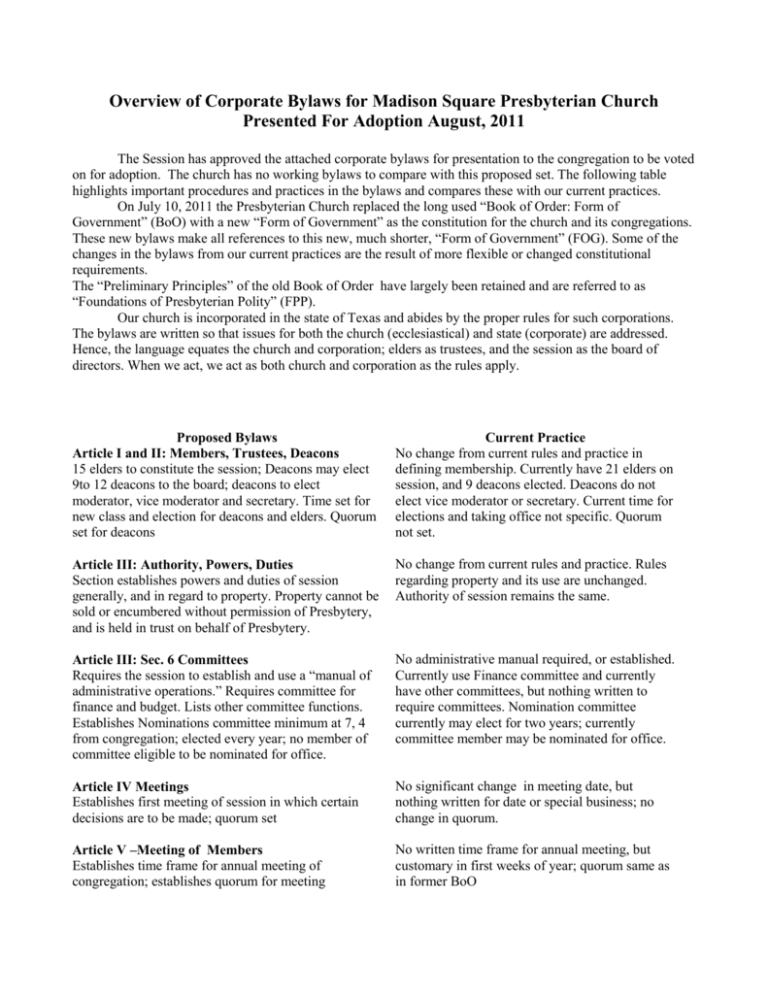
Overview of Corporate Bylaws for Madison Square Presbyterian Church Presented For Adoption August, 2011 The Session has approved the attached corporate bylaws for presentation to the congregation to be voted on for adoption. The church has no working bylaws to compare with this proposed set. The following table highlights important procedures and practices in the bylaws and compares these with our current practices. On July 10, 2011 the Presbyterian Church replaced the long used “Book of Order: Form of Government” (BoO) with a new “Form of Government” as the constitution for the church and its congregations. These new bylaws make all references to this new, much shorter, “Form of Government” (FOG). Some of the changes in the bylaws from our current practices are the result of more flexible or changed constitutional requirements. The “Preliminary Principles” of the old Book of Order have largely been retained and are referred to as “Foundations of Presbyterian Polity” (FPP). Our church is incorporated in the state of Texas and abides by the proper rules for such corporations. The bylaws are written so that issues for both the church (ecclesiastical) and state (corporate) are addressed. Hence, the language equates the church and corporation; elders as trustees, and the session as the board of directors. When we act, we act as both church and corporation as the rules apply. Proposed Bylaws Article I and II: Members, Trustees, Deacons 15 elders to constitute the session; Deacons may elect 9to 12 deacons to the board; deacons to elect moderator, vice moderator and secretary. Time set for new class and election for deacons and elders. Quorum set for deacons Current Practice No change from current rules and practice in defining membership. Currently have 21 elders on session, and 9 deacons elected. Deacons do not elect vice moderator or secretary. Current time for elections and taking office not specific. Quorum not set. Article III: Authority, Powers, Duties Section establishes powers and duties of session generally, and in regard to property. Property cannot be sold or encumbered without permission of Presbytery, and is held in trust on behalf of Presbytery. No change from current rules and practice. Rules regarding property and its use are unchanged. Authority of session remains the same. Article III: Sec. 6 Committees Requires the session to establish and use a “manual of administrative operations.” Requires committee for finance and budget. Lists other committee functions. Establishes Nominations committee minimum at 7, 4 from congregation; elected every year; no member of committee eligible to be nominated for office. No administrative manual required, or established. Currently use Finance committee and currently have other committees, but nothing written to require committees. Nomination committee currently may elect for two years; currently committee member may be nominated for office. Article IV Meetings Establishes first meeting of session in which certain decisions are to be made; quorum set No significant change in meeting date, but nothing written for date or special business; no change in quorum. Article V –Meeting of Members Establishes time frame for annual meeting of congregation; establishes quorum for meeting No written time frame for annual meeting, but customary in first weeks of year; quorum same as in former BoO Necessary in new FOG Article VI – Officers Sets certain date for election of officers; establishes office of President on session elected annually for one year; sets criteria for officers: President a session member but not Pastor, clerk an elder, and treasurer a member of the church; allows for appointment of additional officers. Article VI – Officers, President, Vice President Establishes a line of authority for signing all documents binding on the church, and allows for annual delegation to certain persons for particular signing authority; maintains control over who signs checks, leases, contracts, documents. Responsible for maintenance of “Administrative manual of operations”. Pastors are ineligible to be President or for these functions. All fiscal authority resides in session to hold and delegate. Changes made in officers of session. President was not an officer of session, but a name on the Corporation documents for the state, now a functioning office, Pastor listed as President; allows treasurer to be a member of church, but not elder (not changed from former BoO). Article VI – Officers, Clerk No change. Article VI –Officers, Treasurer, Assistant Treasurer Specifies duties of treasurer; does not sign checks or documents unless by delegation. Has oversight of counting and receiving all money, and depositing money. No substantial change, but current situation is not specified or detailed. Some duties left with ambiguity. No detailed line of authority regarding treasurer. Article VI –Section 4, Checks, Notes, Obligations Empowers the session to establish how all obligations shall be handled and by whom. The President with the session sets the authority and its limits on all signers and handlers of funds and documents. Article VII –Fiscal Year; Seal; Office All new. While the session has the responsibility for handling all funds and documents, there has been no established protocol, and ambiguous use of authority and signing of documents. Article VIII –Indemnification Establishes necessary protection for elders and officers. No statement requiring this protection, but insurance policy offers protection. Article IX –Amendments No current bylaws. Article X – Dissolution Sets out process of handling property if church dissolves. Essentially the same rules by which property is handled under the former BoO and non-profit statement in the state charter. All new. No singular line of authority for signatures on documents; ambiguous line of delegation for signing authority. No administrative manual of operations written or in effect. Pastor had presumptive powers in some of these areas. Fiscal authority ambiguous. No change from current practice.
